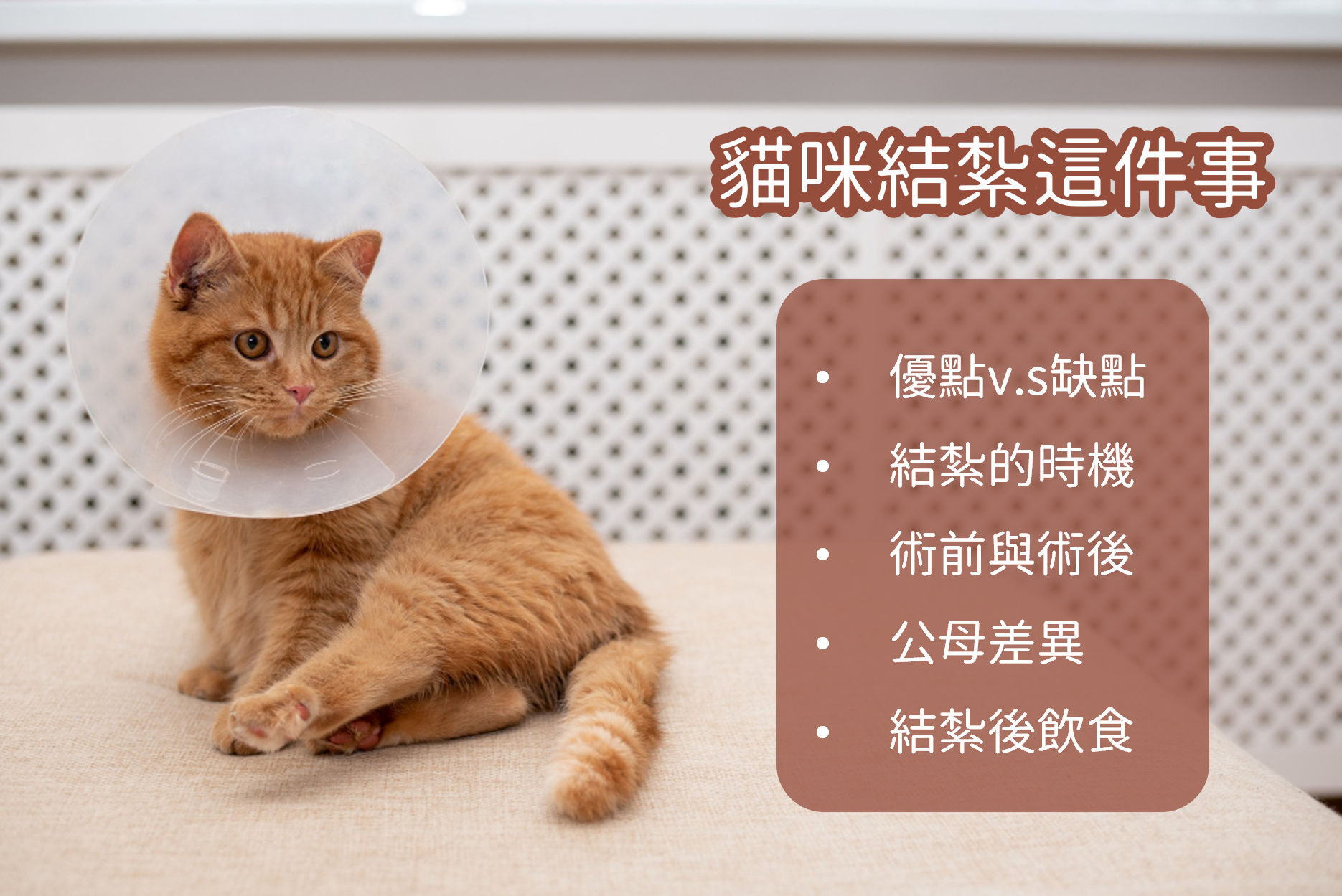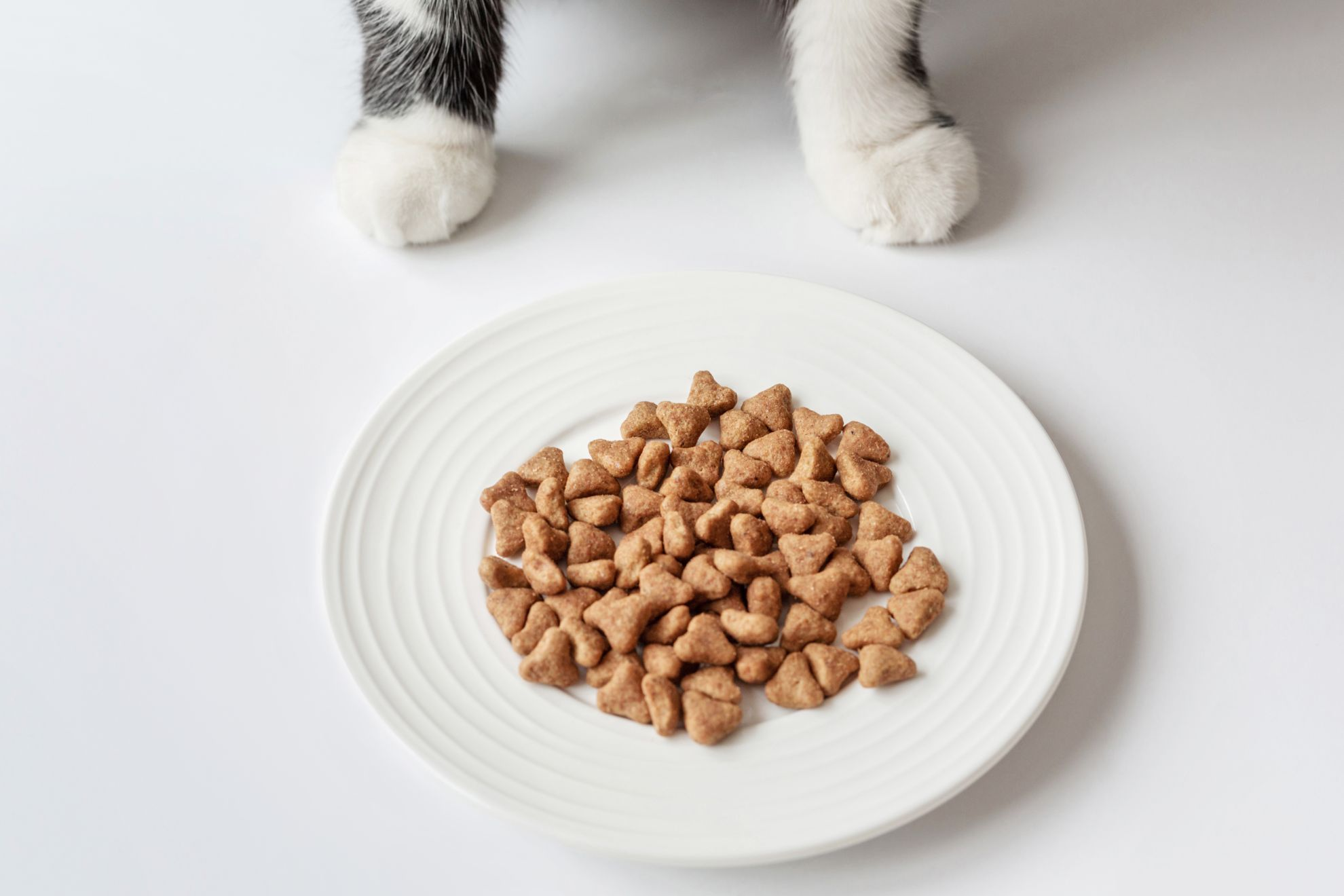Neutering Process for Cats: Learn about Pre- and Post-Neutering Care
Article

1) What are the advantages and disadvantages of neutering cats?
2) When is the best time to neuter my cat?
3) What pre-surgery examinations are needed for neutering a cat?
4) How do the neutering procedures differ between male and female cats?
5) What special post-operative care is required?
6) What dietary changes are needed for cats after neutering?
Still Struggling? Let’s Look at Some of the Benefits!
Generally speaking, the advantages of neutering cats outweigh the disadvantages. Let's take a closer look to help you to make the best decision:
Advantages of Cat Neutering
1) Avoiding the Impact of Heat on Quality of Life
Unneutered cats will go through heat cycles. Female cats will emit extremely loud cries, similar to a baby’s wail, which can be quite bothering. On the other hand, male cats tend to spray urine everywhere to mark their territory,being more irritable and hard to calm. Additionally, both male and female cats may attempt to escape to find a mate, increasing the risk of lost pets.
2) Improving Cat Behavior
Neutered cats generally become more gentle and calm, reducing the likelihood of rampaging. If you have multiple cats, neutering can also help prevent conflicts and fights.
3) Preventing Reproductive System Diseases
According to the "2017 Seminar on Pet Tumor," Fibroadenoma ranks second in cat cancers, with a malignancy rate of 85-95%. Neutering can effectively reduce the risk of hormone-related diseases such as Fibroadenoma, pyometra (uterine infection), and ovarian cysts.
4) Avoiding Unplanned Litters
Keeping pets requires long-term planning, especially when cats can have multiple kittens in each litter. If you do not intend to breed your cats, neutering can prevent unexpected births and the corresponding challenges that come along.
Disadvantages of Cat Neutering
1) Increased Risk of Weight Gain
Neutering can slow down a cat’s metabolism and make them more sedentary. If their diet remains the same as before the surgery, weight gain is likely to happen. Therefore, it is important to adjust their diet and ensure they get plenty of exercise to maintain a healthy weight.
2) Permanent Sterilization
Neutering involves the removal of the testicles in males and the uterus and ovaries in females, making it an irreversible procedure. Consequently, neutered cats will be unable to reproduce for the rest of their lives.
When? Know More about The Optimal Time for Cat Neutering
The timing for neutering female and male cats is slightly different. Female cats are typically neutered at around 5 to 6 months old, while male cats are usually neutered between 7 to 10 months old. Both should have completed their basic vaccinations by this time. Generally, the ideal timing for neutering is between "complete physical development" and "before showing signs of heat." However, the exact timing should be based on the individual cat's physical condition, the vet's assessment, and the specific household environment. There is no absolute best time for neutering. Therefore, if you are considering having your cat neutered, it is advisable to consult your vet for detailed information in advance.
No Worries! Your Vet Will Conduct Thorough Examinations Before Neutering!
Before your cat undergoes neutering surgery, the vet will conduct a series of preoperative examinations to ensure the cat's physical condition is optimal for the procedure:
1) Basic Physical Examination
This includes a consultation, auscultation (listening to internal sounds), palpation, measuring body temperature, and stool examination to check for parasites, digestive issues, and the balance of gut flora.
2) Hematology Test
Blood samples are taken for hematological tests and assessments, including complete blood count, serum biochemistry, and endocrine testing.
3) X-ray Imaging Examination
This primarily checks for abnormal masses in the thoracic and abdominal cavities, as well as any skeletal and soft tissue lesions.
It is best to schedule the neutering surgery only after confirming that the cat's overall physical condition is good enough for operation.

Distinct Neutering Procedures between Male and Female Cats!
Just like humans, male and female cats have completely different reproductive system structures, and thus, the neutering procedures are also different:
|
|
Male Cats |
Female Cats |
|
Pre-Surgery Preparation |
The veterinarian will provide the cat with oxygen for 3 to 5 minutes and administer preoperative medications, such as sedatives, pain relievers, and antibiotics, based on the individual cat's condition. Then, anesthesia will be induced, and the surgical area will be shaved and cleaned. |
|
|
Surgery Method |
Removal of Testicles: The veterinarian will make a small incision next to the scrotum to extract the testicles. |
Removal of Uterus and Ovaries: The veterinarian will make an incision in the lower abdomen of the female cat and remove the uterus and ovaries. |
|
Post-Surgery Observation |
The cat will be placed in a warming box for observation, allowing it to rest and recover gradually. Once the cat has returned to normal consciousness, it will be fitted with an Elizabethan collar (cone) and prepared for discharge. |
|
|
Precautions |
Some male cats may have "cryptorchidism," where the testicles are located in the abdomen or under the skin instead of the scrotum. This condition increases the complexity and cost of the surgery. Male cats with cryptorchidism should be neutered early to prevent potential health issues in later life. |
It is essential to perform a complete spaying to reduce the risk of mammary tumors in female cats. Simply removing the ovaries does not lower this risk. |
Take Good Care of Your Cat: Understanding Pre- and Post-Neutering Special Care
Before Cat Neutering:
1) Water and Food Restrictions
In general, it's recommended to restrict water for 4 hours and food for 12 hours before surgery. However, the veterinarian will advise on appropriate fasting and water restriction based on the individual cat's health condition. Fasting is crucial for general anesthesia as it helps prevent food from entering the airway during surgery, which could lead to complications such as aspiration pneumonia.
2) Continuous Monitoring on the Day of Surgery
Maintaining the cat's health before surgery is essential. Therefore, it's important to carefully observe the cat's condition on the day of surgery. If any sudden issues arise, it may be necessary to postpone the surgery.
After Cat Neutering:
1) Limiting the Cat's Activity
During the recovery period when the anesthesia wears off, cats may experience emotional fluctuations. To prevent them from running or jumping around the house and risking wound rupture, it's recommended to keep the cat in a cage or carrier until their emotions stabilize, and then allow them to move freely.
2) Using an Elizabethan Collar (E-Collar)
This prevents the cat from licking or biting the wound, which could loosen the stitches or lead to bacterial infection. Cats may find wearing the collar uncomfortable, so if using a closed litter box, consider removing the lid to facilitate entry and exit, preventing the cat from holding urine or urinating inappropriately.
3) Isolating the Cat When Necessary
If there are other pets in the household, consider isolating the neutered cat in a quiet environment to rest alone. This prevents it from playing, fighting, or grooming with other pets, which could affect wound healing.
4) Choosing Dust-Free Cat Litter
For the first 1 to 2 days after neutering, consider using dust-free options such as tofu litter, wood chip litter, crystal litter, paper litter, or dust-free mineral litter to reduce the risk of wound infection. However, it's important to consider the cat's preference.
5) Monitoring Wound Healing Progress
After neutering, closely observe the cat's wound daily and keep it clean and dry. If the wound shows signs of stitch slippage, splitting, excessive swelling, or yellow discharge, it may be infected, and the immediate veterinary attention is necessary.

Proper Diet After Neutering is Essential to Maintain Health!
The most significant downside that comes along with neutering for cats may be weight gain. Since the cat's physiological mechanisms have been altered, its metabolism tends to slow down. If the cat's post-neutering eating habits and diet content remain the same, the cat may gradually become overweight, leading to other health problems such as urinary tract issues, especially in male cats.
Therefore, after neutering your cat, it's essential to manage their diet carefully. It's recommended to increase the intake of high-quality protein to help the cat maintain good muscle mass and achieve an ideal body condition. Additionally, foods rich in fiber can provide the cat with a sense of fullness, reducing the need for constant snacking. Feeding nutritionally balanced cat food that supports urinary system health can comprehensively care for the health of neutered cats.
Like & share this page